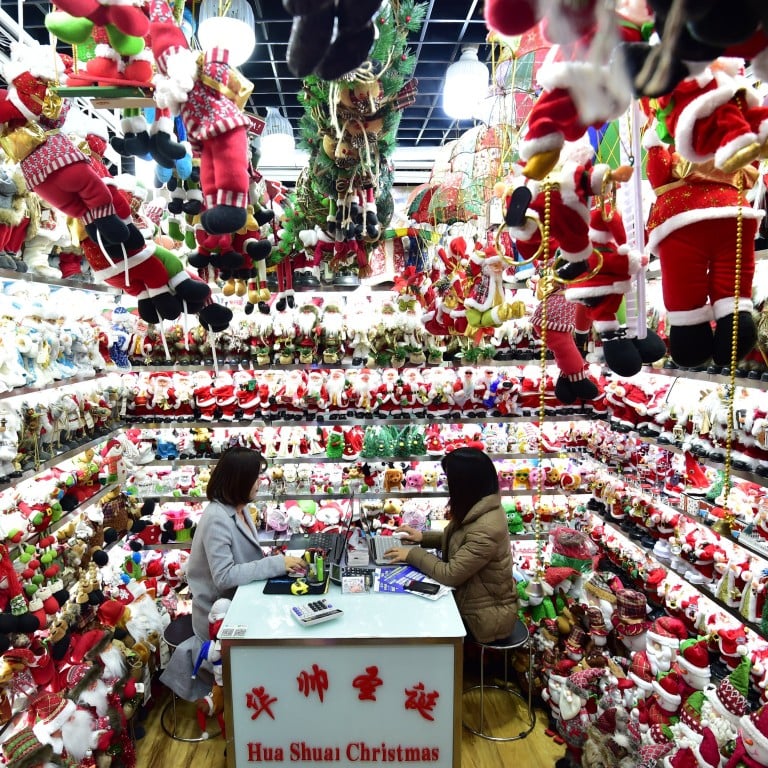
Wholesale traders in Yiwu rue losses as US tariffs point to a woeful purchasing period ahead of Thanksgiving and Christmas
- Yiwu, the shopfront of the world’s factory, is where every conceivable made-in-China product from cocktail umbrellas to machine parts is sold
- In previous years, May would be the start of a busy period when buyers from the US and Europe descend on Yiwu to place orders for August shipments in time for the Christmas shopping season. Not this year
Jiang Junhong, idling at a stall stacked with hundreds of flashlights and light-emitting devices of different designs, perks up whenever anyone approaches his space at the Yiwu International Trade market.
His once bustling business, where the minium order filled up entire 20-foot shipping containers, had dwindled ever since US President Donald Trump fired the first salvo of his trade war with China last year. For the first time in a long while, he has to serve retail customers, selling flashlights for 30 yuan (US$4.30) apiece.
“It will be a tough year for us, since business appears to have weakened,” Jiang said during a recent visit this week to this city of 1.2 million people in central Zhejiang. “We are taking a hit from the trade war. We are hoping that buyers from the Middle East and Europe” can make up for the slack left by the American market.

Jiang‘s predicament puts a human face on the economic cost of the year-long dispute between the two largest economies on earth, which may shave an entire percentage point off China’s 2019 growth pace. Chinese exports unexpectedly shrank in April by 2.7 per cent after a 14.2 per cent increase in March, as overseas buyers front-loaded their purchases to get ahead of a May 10 tariff deadline imposed by the Trump administration.
Tariffs kicked in on US$200 billion of Chinese products, including the very flashlights that Jiang sells at Sanxin Electron, which are now dutiable at 25 per cent, from the earlier 10 per cent. That kills his business, said Jiang, who makes a margin of between 5 and 6 per cent.
Located about 150 kilometres from Zhejiang’s provincial capital of Hangzhou, Yiwu is a window into how China manufactured its way from an agrarian economy into the world’s factory and economic powerhouse. If Trump can imagine the physical representation of the Made-in-China phenomenon, it would look very much like Yiwu.
With little arable soil, Yiwu has had an active history of commerce with wealthier neighbouring cities and counties that dates back thousands of years.
That tradition was given an added boost in 2000 with China’s membership in the World Trade Organisation (WTO). With low wages, an abundant labour force comprising rural villagers in search of city jobs, and local authorities with business-friendly regulations, China quickly became the world’s factory floor.
Everything and anything conceivable – cocktail umbrellas, trinkets, Christmas decorations, toys, stationery, machine parts – is made in Yiwu, and sold by the container load. At their peak, Yiwu’s wholesalers shipped 1,000 containers of products from their market every day, according to the local authority.
The city also became an unlikely meeting point for Middle East merchants, amid tightened security screening in the US for visitors from the region following the September 11 terrorist attacks. The influx of Muslims led to the construction of the Yiwu Mosque in 2004, refurbished from a former clothing factory. The city even has a Lebanese bakery, in addition to two dozen restaurants serving halal cuisine.

The local government erected a five-storey trade market in 2002, with enough space to accommodate more than 70,000 stalls for merchants offering countless items in 1,700 categories. Jiang pays 200,000 yuan a year to rent his space, measuring 10 square metres (100 square feet).
Within a decade of China’s WTO ascension, Yiwu became wealthy, boasting at one stage the most number of BMW luxury cars per capita in China.
In 2016, Zhejiang China Commodities City Group, the state-owned operator of the Yiwu wholesale market, took a first step toward internationalising businesses as it set up a similar market in Warsaw, Poland. A direct freight train service commenced in 2017 linking Yiwu with London across 12,000 kilometres, setting the record as the world’s second-longest route after the Yiwu-Madrid line.
Yiwu’s wholesalers must now turn to their large community of Middle-Eastern customers for survival, after Trump more than double US tariffs to 25 per cent on US$200 billion of Chinese exports on May 10.

“We are set to lose our American business,” said Eric Li, who sells leather bags in Yiwu. “As I see it, it’s not just a dispute on commodity trade imbalance. It will eventually lead to an overall boycott of Chinese-made goods in the West.”
Already operating at razor thin margins, wholesalers depend on volume to survive, where even a 10 per cent discount would put them out of business, said Bao Haiying, who sells balloons in Yiwu.
“American and European companies may not bother to produce the candles we are selling due to the thin margin,” said a manager surnamed Sun with Giftworld, a shop that sells candles and bags. “We can improve our manufacturing technique to force them to buy our products which can beat anyone else in the world even with the additional tariffs.”

